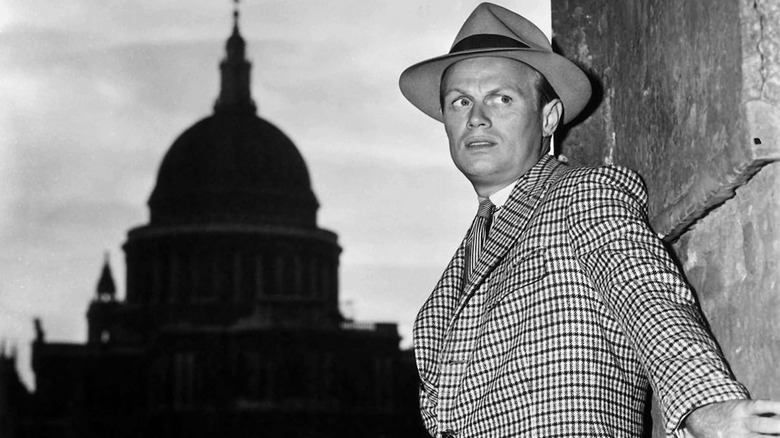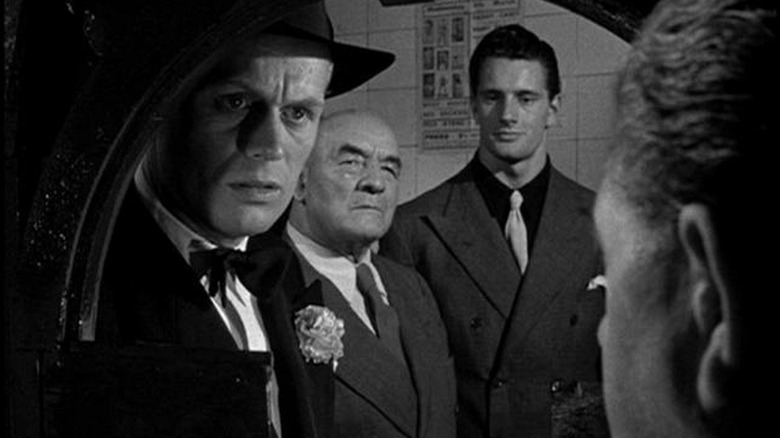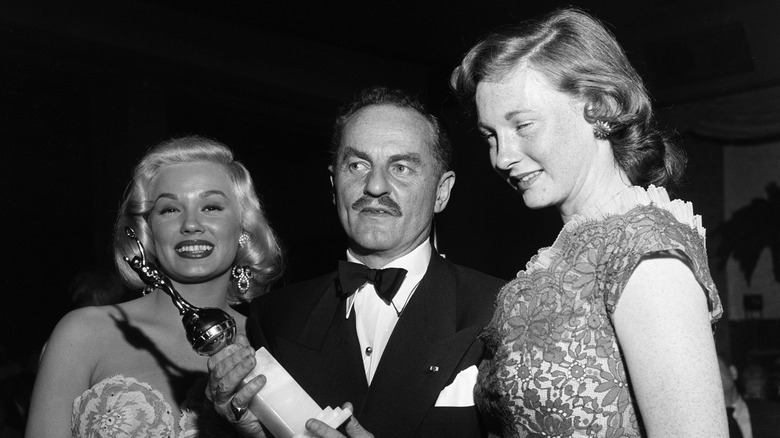The Head Of Fox Fought The Hollywood Blacklist – But Not For The Reasons You Might Think
The Hollywood Blacklist ruined dozens of lives. United States-based artists who were sympathetic to, or even curious about, communism were demonized as traitors to their country and, due to hysterical pressure from The House Committee on Un-American Activities (aka HUAC), banned from working in the industry. Disgraced and unemployed, blacklisted individuals were forced to leave the country if they wanted to continue working or, if they could not afford to relocate, find a line of work where being an alleged communist wasn't frowned upon. This latter option was, of course, dismally unlikely. The mental and financial burden of being completely shunned from one's industry was so unbearable that it led actor Philip Loeb to die by suicide.
This put Hollywood at war against itself. Anyone suspected of having communist ties was pressured to come clean and, if they wanted to continue working, name names (a cowardly practice savaged by films like Fred Zinneman's "High Noon"). One name that kept coming up during HUAC's hearings was Jules Dassin, a well-regarded film and theater director who'd just found a new studio home at 20th Century Fox. Dassin was in his late 30s and hitting his artistic prime. He was smart, efficient, and surprisingly got along well with Fox's notoriously ruthless honcho Darryl F. Zanuck.
Dassin specialized in film noir with social commentary, which made him easily identified as a commie troublemaker. Spyros Skouras, who'd just been named chairman of the studio, was eager to cooperate with HUAC and thus sought to ban Dassin from the lot. But just when it appeared the director's fate was sealed, he found the unlikeliest of allies in Zanuck.
Zanuck wouldn't let Congress run 20th Century Fox
Fox was in the midst of a rough period commercially. Though they were knocking out Oscar-worthy movies like "Laura" and "Gentleman's Agreement," their programmers weren't performing as well as they used to. Zanuck was under enough pressure just trying to figure out moviegoers' changing tastes and how to keep them from staying home to watch television (which is why Zanuck was a vocal champion of CinemaScope). The blacklist was an unwelcome distraction.
As Scott Eyman observed in his book "20th Century Fox: Darryl F. Zanuck and the Creation of the Modern Film Studio," Zanuck's major issue with the blacklist wasn't political, but rather one of control. Senator Joseph McCarthy and his Red Scare compatriots were chasing bankable actors, writers, and directors out of the industry. Zanuck didn't need a bunch of congressional stooges telling him who he could employ.
Zanuck was the furthest thing from sentimental (and monstrous in his own right, which we'll get to in a moment), but he liked and respected Dassin. He wanted to keep him working for the studio. So he did something extraordinary: he turned up on Dassin's doorstep unannounced and basically saved his career. According to Dassin:
"Coming to my house was like visiting the tenements, because I lived on the wrong side of town. He said, 'Get out. Get out fast. Here's a book. You're going to London. Get a screenplay as fast as you can and start shooting the most expensive scenes. Then they [the New York office] might let you finish it.' That was 'Night and the City' ... I really respected the guy."
He had one more unusual-for-Zanuck request: he insisted Dassin cast Gene Tierney as the female lead. He was worried the actor had turned suicidal due to personal problems and hoped that keeping her busy would assuage her misery.
And this was unusual for Zanuck because he was a serial sexual abuser.
When it came to ruining careers, Zanuck was a one-man HUAC
Zanuck, a three-time winner of the Oscars' prestigious Irving Thalberg Award, might've specialized in films that pricked the audience's social conscience, but, as a man, he was utter garbage. When Zanuck ruled the Fox roost, he routinely had female contract performers escorted to his office (allegedly via an underground passage), where he would have his way with them. He was also known to expose his genitals to women employees.
Zanuck's behavior was hardly a secret, and his "casting couch" antics became not just acceptable, but expected behavior from studio executives. There's a direct line from Zanuck to Harvey Weinstein, and you'd have to be pretty naive to believe the latter's imprisonment has scared the predators of the industry straight. They're just less brazen nowadays.
And this stinks because, in saving Dassin's career, Zanuck allowed the filmmaker to knock out a noir classic in "Night and the City," and two of the greatest heist movies ever made in "Rififi" and "Topkapi" (without which, Brian De Palma might've never shot the silent Langley break-in for "Mission: Impossible"). Zanuck's legacy as a studio mogul is, artistically, remarkable. But he was a terrible man who emboldened other terrible men to use their power to abuse women. He probably ruined as many lives/careers as the Hollywood blacklist.
And yet the Fox lot's premiere screening room is, in 2024, still named after Zanuck. But there's a decent chance Americans will reelect to the presidency a man found liable for sexual abuse, so why expect better when, as human beings, we just keep getting worse?


